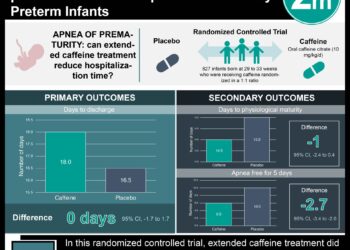Neonatal docosahexaenoic acid supplementation is associated with higher IQ scores at five years of age
1. For infants born before 29 weeks gestation, the use of enteral docosahexaenoic acid (DHA) until 36 weeks of postpartum age was associated with a higher full-scale intelligence quotient (FSIQ) score at five years of age.
2. Adverse events were similar between infants who received 60mg of docosahexaenoic acid per kilogram of body weight and those who received a control emulsion.
Evidence Rating Level: 1 (Excellent)
Study Rundown: Children who are born preterm are more likely to have lower cognitive scores and a higher risk of cognitive impairment than children born at full term. Infants born at the earliest gestational age are often deprived of the placental supply of DHA, which makes up approximately 30% of the lipid content of the brain. Current practice for preterm infants is to provide 20mg of DHA per kilogram of body weight per day, and previous trials have determined mostly null effects, but suggest a potential benefit for language at 18 to 22 months of corrected age. However, there is a gap in knowledge as to understanding the general cognitive functioning of infants born before 29 weeks’ gestation who utilized DHA. Overall, this study found that enteral emulsion of DHA at a dose of 60mg per kilogram per day was associated with a modestly higher FSIQ score at five years of age than those who received a control emulsion. This study was limited by higher-than-anticipated attrition and a range of ages at assessment that was wider than planned. Nevertheless, these findings are significant, as they demonstrate that supplementation of 60mg of DHA per kilogram per day for preterm infants born before 29 weeks gestation should be utilized to approximate the fetal required rate.
Click to read the study in NEJM
Relevant Reading: Docosahexaenoic Acid and Bronchopulmonary Dysplasia in Preterm Infants
In-Depth [randomized control trial]: This multicenter, blinded, parallel-group, randomized control trial evaluated the effect of DHA feeding on bronchopulmonary dysplasia, and the study designers developed this follow-up study to study IQ. Patients who had not been withdrawn from the original trial or had not died were eligible for the trial. Patients who did not fit these criteria were excluded from the study. The primary outcome measured was the FSIQ score, assessed at five years of corrected age with the Wechsler Preschool and Primary Scale of Intelligence, administered by a psychologist or by trained technicians under the supervision of a psychologist in a hospital, the family home, or a local community center. Outcomes in the primary analysis were assessed via an intention-to-treat basis and the use of generalized linear models. Based on the primary analysis, a total of 480 patients had an FSIQ score available, with 241 in the DHA group and 239 in the control group. The mean FSIQ score was 95.4 in the DHA group and 91.9 in the control group (adjusted difference 3.45; 95% Confidence Interval 0.38 to 6.53). Adverse events were similar in the two groups, and though three deaths occurred, they were deemed to be unrelated to DHA or to protocol-directed activities. Overall, this study demonstrated that in children who had been before 29 weeks’ gestation, the mean FSIQ score at five years of corrected age was approximately 3.5 points higher in those who had received supplemental DHA compared to those who had received a control emulsion.
Image: PD
©2022 2 Minute Medicine, Inc. All rights reserved. No works may be reproduced without expressed written consent from 2 Minute Medicine, Inc. Inquire about licensing here. No article should be construed as medical advice and is not intended as such by the authors or by 2 Minute Medicine, Inc.







